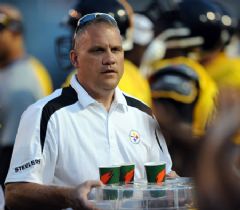As I continue my recovery this evening, I am going to take the opportunity to post an email that my friend & former contributor to OliverFinlay.com, John Geist, sent me in relation to the exercise associated muscle cramps blog.
Unfortunately, whilst I think the blog format looks great, the guys that are developing the platform, haven't yet added a section where you can leave comments in response to the postings...so in the meantime, if you have any pertinent comments that you'd like to share, please just email them through from the "Contact" section & I will post them in a separate blog.
So, great to hear from you John & over to you...
Olli, One of my favourite subjects EAMC!!! I believe in the muscle fatigue theory. The electrolyte/dehydration effects would be systematic not muscle specific.
The heat and hypohydration would cause the body to work harder leading to quicker muscle fatigue.
Usually occurs in 2 jointed muscles, gastroc, hams and quads which are working more.
Favorite treatment is conditioning (practice how you play).
Eating some carbs at halftime helps along with stretching(even on the field while play is going on).
Very common in american High School football where an athlete must play both ways on a friday night. We can't push that athlete that hard in practice each day and when the game comes and the minutes and intensity increases the cramps will arrive. Also noted you must have the type of athlete who will push himself hard enough to reach those levels. We know that american football players get EAMC in the early season while temperatures are hot and their bodies are getting into condition. It decreases as the season goes on. We also know that NHL players get it late in the season while temperatures are rising and their bodies are tiring from the long season and many game playoff format. EAMC increases as the season goes on. One thing to think about. If dehydration or electrolytes theory is correct why does stretching help? Stretching is not replacing any water or electrolytes. But we must always treat the cramps as dehydration first and give water and electrolytes to help! Cheers, John

